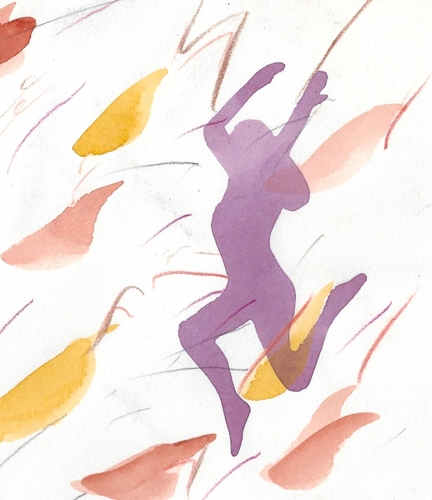BRATTLEBORO — What a perfect time for Toni Ortner's book, Daybook III: Morning Is Long Since Gone, to come out!
This third “daybook” is comprised of a series of imaginings and musings - maybe dreams, maybe reveries, maybe memories - interspersed with 14 illustrations by Ortner's collaborator, Linda Rubinstein.
A very short chapter might be prompted by world news of the past, present, future. Sometimes there is an exploration of personal insights based on these dreams or imaginings.
These short “set pieces” –– the longest is three pages - are arranged by date, as in a journal from Feb. 2, 2019 to March 30, 2019. It was written pre-pandemic, but there is a sense of foreboding throughout. Doors are open, then - suddenly, mysteriously - they close. The narrator expresses a sense of claustrophobia, of being trapped.
Ortner has inserted herself into these scenarios, almost like a written version of contemporary photographer Cindy Sherman's work, though in a decidedly-more-serious, less-ironic vein.
Some pieces are posed as personal recollection, as in “Dear Mother,” so short it can be seen as a prose poem.
In “I Cannot Remember Your Face,” Ortner writes: “I asked if you ever thought of sleeping with me, and you hummed, 'It never entered my mind.'
“I brought you red roses,” she wrote. “It did not end well.”
* * *
Ortner's recounting of dreamlike scenarios, many causing anxiety-provoking emotions, gains strength through her “just the facts” manner of telling.
A much-published long-time poet, Ortner knows the power of brevity. Her prose, while sometimes describing scenes that could be inspired by disturbing world situations, as in “Laos Seen From Above,” which imagines the writer being among those on the ground as U.S. bombs rain down on the country, is straightforward, yet not strident with message, as it so easily could have been in the hands of another writer.
Nevertheless the message is clear: While an act of imagination, the story is above all a plea for compassion.
“I Am X4578” is written from the perspective of an immigrant caught at the border, then jailed, and the story draws a parallel to those interned during the Holocaust. (“I am 47892. That number is not on my skin.”)
At times I wanted to know if what I was reading was dreamed or imagined, or whether (and to what extent) a vignette was influenced by real-life events. Eventually, I came to go with the ambiguity, even appreciate it. It adds a note of intrigue.
There are shades of magic realism, too, as in “What If Time Were a Frozen River?", which starts out talking about fat brown speckled trout and ends up with the narrator seeing slides of scenes from her life, floating, brushing up “against a frog, a turtle, a rock, and moss.”
Then, suddenly, the reader comes across a prose-poem asking existential questions, as in “It Is Definitely a Message”: “How to transmit is the question./It cannot be reduced to nouns and verbs./No equation bears the weight of years./That crack you saw in the floor turns into a river./The oak outside the window holds six stars./Is this what it means to grow old?/To fold space around your shoulders like a cloak?”
There is a fluid range of approaches in this collection, yet it does feel of a piece.
* * *
The writing is interspersed with illustrations, figures, and abstract designs by Linda Rubinstein of Dummerston.
Rubinstein's paintings, usually done in watercolor, also seem like dream imagery: figures dance or tumble in midair, or they are bedecked in leaves or flowers. Many are minimalist, bordering on abstract, and playful. They are a lovely counterpoint to Ortner's text.
This surprising and engaging book, published by Ardent Writer Press, is available at Everyone's Books in Brattleboro and from Amazon.com.
